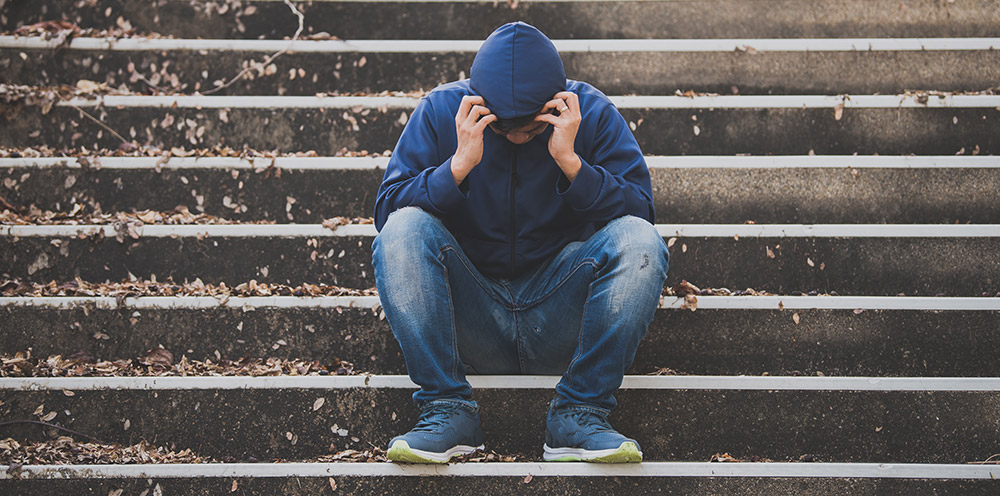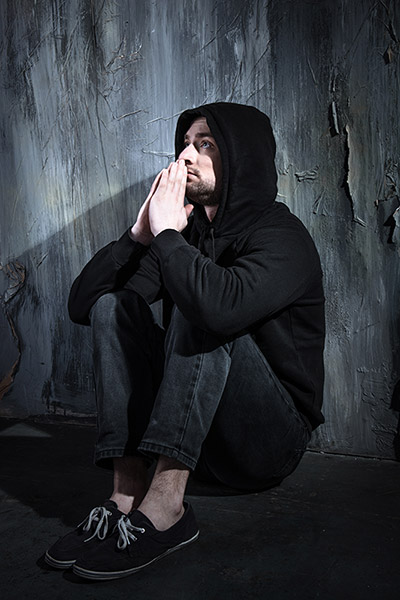Heroin Addiction & Abuse
Heroin, medically known as diamorphine, is a highly addictive opiate with powerful effects on the brain. Due to its rapid onset and rush of dopamine (the feel good chemical) combined with a short-lived high, its potential for abuse is very high. For some, this cycle of abuse becomes a daily habit, taking control of an individual’s daily routine. They become so dependent on heroin that nothing else feels important, and they will do anything to get their next fix. Heroin addiction has many implications on physical and mental health, with far-reaching implications on family relationships and the wider community. This guide will help you understand what heroin addiction is, the signs and symptoms and the dangers of long term abuse.
- What is Heroin Addiction?
- Heroin Addiction VS. Abuse
- What Makes Heroin Addictive?
- How Heroin Addiction Develops
- Signs & Symptoms of Heroin Addiction
- The Dangers of Heroin Addiction
- Heroin Use in Teens
- Heroin Use in Pregnancy
- Heroin Use and Employment
- Mixing Heroin with Other Drugs
- Getting Help for Heroin Addiction
- Frequently Asked Questions
What is Heroin Addiction?
Heroin is an opioid which consists of a powder or tar and is derived from morphine. Also known as smack, it has remained an illicit drug of choice for many in the UK and beyond. In the UK itself, heroin is a controlled substance and not permitted for manufacture or distribution.
A heroin addiction can develop after a single use or multiple uses. It works by creating a rush within the brain and turning off the body’s pain receptors. The pleasure sensation is reinforced as it conceals negative emotions and thoughts. It becomes a source of dependence as the body needs more to reach the same “high” or “pleasure.” This leads to a tolerance.
Individuals who develop a heroin addiction often abuse opioid prescriptions while up to 6% of persons using opioid prescriptions move onto heroin over time (NIDA). This is commonly known as an Opioid Use Disorder.
An individual who is unrealistic about their drug use, who continues to take drugs despite negative consequences, or who denies their drug use is more likely to have developed a heroin addiction or an opioid use disorder.

Heroin Addiction VS. Abuse
A heroin addiction is characterised by a drug dependence, tolerance, and an inability to quit using despite negative consequences such as poor relationships with family, legal trouble, and health complications.
Drug abuse involves the infrequent or social use of the drug but with an ability to stop using and to continue functioning in personal, professional, and other spheres of life.
An addiction is about a lack of control and an inability to meet important life obligations. When compared to abuse, individuals have the ability to manage or regulate their use.
An example would be a person who is on the brink of divorce and performing poorly at work because of using heroin, and still being in denial about its negative impact or recognising the effects but are unable to quit.
Those who abuse heroin may use at a party, socially, or among friends but will stop thereafter and continue to maintain relationships, work, or study life.

What Makes Heroin Addictive?
Heroin is a highly addictive illicit drug because of its rapid effects on the brain. When the substance is used, it will bind to the opioid receptors within the brain. Things includes pain and pleasure receptors, and the cells governing vital functions such as breathing and sleeping (NIDA).
How Heroin Addiction Develops
Because heroin has such a powerful effect on the brain, individuals can develop a substance dependence disorder from the single use of the drug. We look at the factors behind developing and maintaining a drug addiction.
Repeat Exposure
For those who are unable to quit using, we can determine the presence of an addiction. Repeat exposure can cause a possible drug dependence as it involves habit forming activity. The more one is exposure to the drug (and uses it), the greater the tolerance and the formation of dependence (American Addiction Centers).
Trauma & Pre-existing Mental Health Conditions
The experience of a past trauma or a pre-existing mental health condition places individual at higher risk of developing an addiction compared to those who don’t. Research has shown that persons with a trauma in childhood or those affected by chronic depression and anxiety are at higher risk of addiction owing to their vulnerabilities.
Mental health conditions such as depression are relieved when heroin is used as the brain’s pleasure principle is activated. Where pre-exiting mental health disorders are present in addition to an addiction, it is referred to as a dual diagnosis.

A Family History of Opiate Use
Factors that include determining patient risk for an opiate addiction is an assessment of family history. Where there is a risk of a hereditary dependence on opiates, the drug is seldom prescribed in a clinical setting for such persons (opiates include pain medication) (Pain Management Nursing).
Research has focused on individual risk factors concerning the predisposition to developing a substance addiction. According to Pathways of Addiction: Opportunities in Drug Abuse Research, the contribution of genetic, biological, and environmental factors increases vulnerabilities to use and depend on illicit drugs. Findings have suggested that illicit drug use and heritability in adulthood could be attributed to genetic factors that underlie behavioural problems as a child. Twin studies involving high correlations of drug use showed higher rates of underlying or pre-existing psychological conditions increasing the propensity for substance use and dependence.
Signs & Symptoms of Heroin Addiction
Healthline Breaks Down the Following Signs and Symptoms of Heroin Addiction:
Individuals who inject heroin will experience a rush of euphoria including physical symptoms:
- Restricted pupils
- Flushes skin
- Dry mouth
- Poor impulse control
- Sleepiness
- Disorientation
- Heaviness
- Memory loss
- Poor decision making
- Nausea.
Diagnosing Heroin Addiction
The DAST-10 questionnaire is a brief assessment tool designed to provide a self report for clinical screening, population assessment, and treatment based research in adults and in older youth.
DAST-10 is condensed from the DAST-28 and provides a quantitative questionnaire in which individuals are assigned an index concerning their level of drug abuse.

The Dangers of Heroin Addiction
If you or someone you know is addicted to heroin, seeking help as soon as possible can prove life saving. Heroin is a strong opioid that is responsible for many physical and medical complications. It increases risk of miscarriage, disease spread (needle sharing), and potential for a fatal drug overdose (Healthline).
Individuals who have used heroin for a long time report kidney problems while others can suffer organ damage, heart attacks and strokes owing to the coagulation of the blood vessels.
In the UK, drug statistics in Great Britain revealed that 8 o every 1000 people aged 15 to 64 years were actively using opioids such as heroin. The UK also has one of the biggest treatment groups for opioids since 2017. An average 57 430 people reported an opioid problem with one third claiming to inject heroin and two thirds smoking heroin (GOV.UK)
In 2018 in the UK, opioid misuse was the leading cause of drug misuse deaths. Of 2917 cases, around 1336 deaths were related to heroin or morphine (GOV.UK).
Needle Use
Needle use and sharing is prominent in heroin addiction. It increases the risk of disease transmission including hepatitis and HIV AIDs. As viruses spread through body fluids including blood, injecting places individuals in a high risk category for such illness.
Heroin Use in Teens
Heroin use is not uncommon among adolescents with data indicating that children as young as 15 years are using heroin. Teens are more likely to become addicted to heroin faster because of the instant euphoric effects on their developing brains. Changes in the natural release of pleasurable chemicals in the brain draw teens into a deep state of addiction. It also causes physical changes in brain function. Children who take heroin are more likely to develop problems as an adult.
Heroin Use in Pregnancy
The use of heroin during pregnancy can lead to multiple complications including Neonatal Abstinence Syndrome (NAS). When heroin is used in pregnancy, the drug passes to the foetus resulting in the unborn baby becoming dependent on the opioid (NIDA).
Babies that are born to heroin dependent mothers will show signs of withdrawal upon birth including:
- Tremors
- Fever
- Chronic crying
- Vomiting and diarrhoea.
Infants born to heroin dependent mothers must be hospitalised to avoid life threatening circumstances.
Mothers who breastfeed are also not providing their newborns the best start in life. Heroin can pass to the infant through the breast milk, and again, create a dependency.
Infants must be treated with medication to ease symptoms and facilitate recovery from dependence.

Heroin Use and Employment
Heroin use causes physical and functional changes in the brain. It is highly addictive owing to its short term euphoric effects. Individuals who depend on heroin are unable to maintain sound decision making, instantly fall asleep, suffer from poor self-control, and drug cravings. This limits the ability to be productive at work.
Mixing Heroin with Other Drugs
Heroin on its own can lead to physical and mental health complications but when combined with other substances, there is greater risk of life threatening circumstances. Unfortunately, the appeal of “poly-drug” use is growing rapidly and mixing heroin with other drugs, such as cocaine, can increase the pleasurable effects and minimise withdrawal sensations.
Mixing heroin with other drugs also complicates the recovery process, due to the need for detoxing from multiple drugs and the potential risks associated with it.

Getting Help for Heroin Addiction
If you need help for a heroin addiction, we encourage you to speak to us to determine which steps you need to take in your journey towards recovery. There are numerous options available to you and our role is to help you find the right fit.
Getting help for a heroin addiction includes residential heroin rehab as part of a recovery programme. Heroin rehab requires individuals to remain at the facility for at least 28 days (the longer the better) during which a heroin detox is performed, withdrawal symptoms managed, and therapy readily accessible.
Private rehab does not have to be within a residential setting. An outpatient programme includes visiting a private therapist.
If you are interested in free outpatient services, these facilities are governed by the NHS, charities and support groups. NA and CA are support groups in which individuals share their experiences, their addictions, and their personal struggles. Support groups are available throughout the UK, with meetings running daily.
